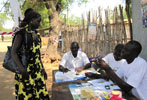
There’s been no shortage of high-level attention to Sudan as of late, from President Obama’s comments on YouTube yesterday, to strong words from U.N. Ambassador Susan Rice, and comments by Secretary of State Hillary Clinton on the anniversary of the CPA. Whether you agree or disagree with their statements, they all clearly articulated the administration’s Sudan policy, emphasizing the perils and prospects that face the country during the coming year.
But the senior U.S. official who spoke to Reuters this week about Sudan’s upcoming elections not only fails to grasp the nuances of the administration’s Sudan policy; the official also seems to fundamentally misunderstand how elections work:
"Yes there are probably irregularities, yes, in all elections there are probably some," the official told Reuters in a telephone interview late on Monday.
"But in the big scheme of things … there’s probably a high probability that if 16 million people come out and vote, that … will reflect a large proportion and fair proportion and credible proportion of the Sudanese voting population."
The official, speaking on condition of anonymity, said estimated numbers of false registrations ranged from between 300,000 to 1.5 million from a total of more than 16 million voters.
"It makes it very difficult to sway an election because the numbers are so great," the official added. "I don’t see all these gross violations."
There is so much that is wrong with this assessment that it’s hard to know where to start. First, as Enough and nine other advocacy groups argued in a recent paper, conditions for free and fair elections in Sudan involve far more than some rough math about the number of registered voters. Conditions conducive to credible elections must include protections of the rights of assembly and ability of candidates from all parties to campaign, freedom of the media, the independence and effectiveness of the National Elections Commission, freedom of movement for international and domestic elections monitors, steps to prevent election violence, and urgently needed voter education efforts, to name just a few.
So how is Sudan shaping up in terms of these key components of electoral integrity? Although this anonymous official denies “gross violations” in Sudan, Human Rights Watch just warned that “violations of civil and political rights by Sudanese security forces throughout the country are seriously undermining prospects for free, fair, and credible elections in April 2010.” And today, former president Jimmy Carter—whose Carter Center has the only elections observation team currently on the ground in Sudan—takes to the Washington Post to warn: “The international community must do more to help ensure successful elections” in Sudan. He specifically cites weaknesses with the National Elections Commission and the “unacceptably repressive” national security act recently passed by the Sudanese government as red flags.
Secretary of State Clinton too, has made clear the steps that Sudan’s ruling party must take in advance of elections: “The NCP, therefore, must … suspend elements of the national security and public order laws that are incompatible with free and fair elections. There must be no efforts to restrict freedom of speech and assembly. And there must be no prohibitions on peaceful protests.”
Aside from the fact that a U.S. diplomat is using the cover of anonymity to color outside the lines of U.S. policy, what bothers me about these comments is their willful ignorance as to what can happen when elections go bad. In the past few years we’ve seen how U.S. support for fatally flawed elections in Kenya and Afghanistan have resulted in immense human suffering and deep blows to our strategic interests. Why does this official think that Sudan will be different?
Photo: Woman registers to vote in Juba, southern Sudan (Enough/Maggie Fick)

